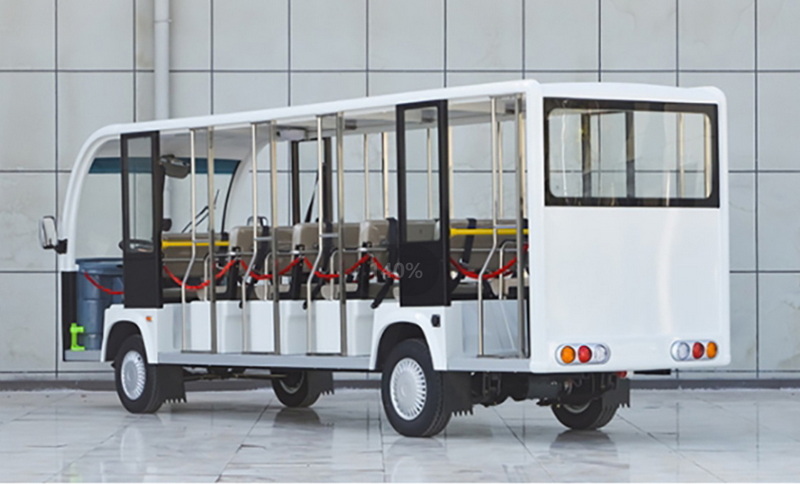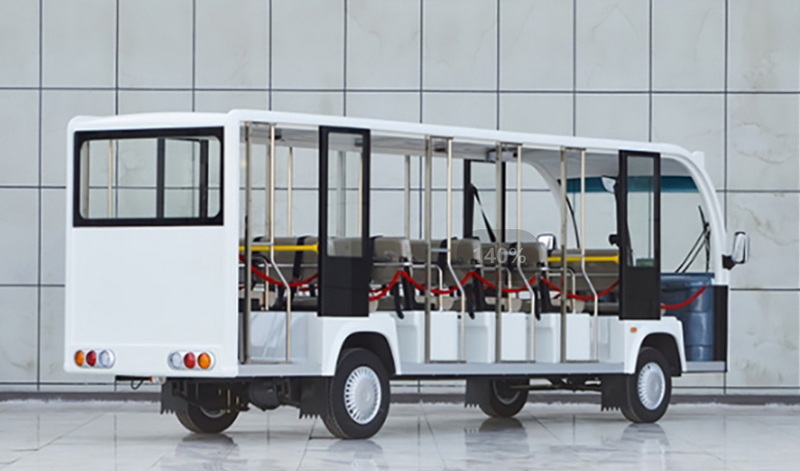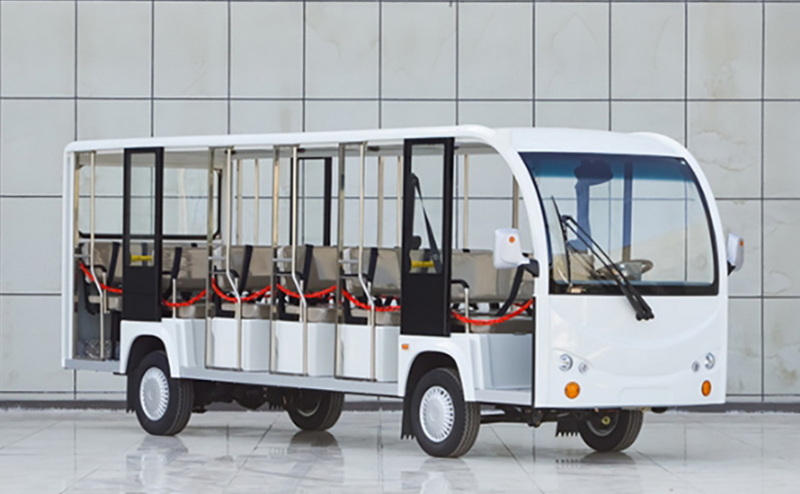Content Menu
● Why Choose an Electric Sightseeing Cart for Off-Road Adventures?
● Key Features to Consider for Off-Road Electric Sightseeing Carts
>> 1. Ground Clearance
>> 2. Motor Power
>> 3. Battery Range
>> 4. Suspension System
>> 5. Tire Design
>> 6. Seating Capacity
>> 7. Weather Protection
>> 8. Safety Features
● Top Electric Sightseeing Cart Models for Off-Road Use
>> 1. Langqing Electric Sightseeing Bus LQY230
>> 2. 2023 Best Design Electric Off-Road Golf Cart
>> 3. KingHike Street Legal Off-Road Electric Golf Carts
>> 4. Star EV Diablo
>> 5. Marshell 8 Seater Electric Sightseeing Bus DN-8M
>> 6. Rivian R1T (For Extreme Off-Roading)
>> 7. GMC Hummer EV
● In-Depth Comparison: Performance, Comfort, and Versatility
>> Performance
>> Comfort
>> Versatility
● Use Cases and Adventure Scenarios
>> Nature Reserves & Parks
>> Resorts & Adventure Parks
>> Extreme Terrain Exploration
>> Family Outings
>> Event Transportation
● Safety and Maintenance Tips for Off-Road Electric Carts
>> Pre-Trip Inspection
>> Weather Considerations
>> Battery Care
>> Cleaning
>> Regular Maintenance
● Emerging Trends in Off-Road Electric Sightseeing Carts
>> 1. Smart Connectivity
>> 2. Solar Charging
>> 3. Autonomous Driving
>> 4. Enhanced Safety Systems
>> 5. Sustainable Materials
● Tips for Choosing the Right Off-Road Electric Sightseeing Cart
● Best Practices for Operators and Tour Guides
● Conclusion
● FAQ
>> 1. What is the average range of an off-road electric sightseeing cart?
>> 2. Are electric sightseeing carts safe to use on steep or rocky terrain?
>> 3. Can these carts be used in all weather conditions?
>> 4. How many passengers can an electric sightseeing cart carry?
>> 5. What maintenance is required for off-road electric sightseeing carts?
Electric sightseeing carts have revolutionized the way we explore the outdoors, offering a sustainable, quiet, and comfortable alternative to traditional gasoline-powered vehicles. With the growing demand for eco-friendly tourism and adventure activities, manufacturers are now designing electric carts specifically for off-road adventures. These advanced vehicles combine rugged engineering with modern electric technology, making them ideal for everything from scenic park tours to extreme off-road expeditions.
In this comprehensive guide, we'll explore the best electric sightseeing cart models for off-road use, delve into their features, and provide expert advice on choosing, maintaining, and enjoying these remarkable vehicles. Whether you're a resort manager, adventure tour operator, or an outdoor enthusiast planning your next family outing, this article will help you make an informed decision.

Why Choose an Electric Sightseeing Cart for Off-Road Adventures?
Electric sightseeing carts are rapidly gaining popularity in off-road environments for several compelling reasons:
- Eco-Friendly Operation: Electric carts produce zero emissions, making them perfect for nature reserves, parks, and wildlife areas where environmental protection is a priority.
- Quiet Performance: The near-silent operation of electric motors ensures minimal disturbance to wildlife and enhances the peacefulness of natural settings.
- Low Maintenance: With fewer moving parts than gasoline engines, electric carts require less frequent and less costly maintenance.
- Instant Torque: Electric motors deliver power instantly, providing the necessary force to tackle steep inclines and rough terrain.
- Customizability: Many models offer modular seating, cargo options, and weather protection, allowing you to tailor the cart to your specific needs.
Key Features to Consider for Off-Road Electric Sightseeing Carts
Selecting the right electric sightseeing cart for off-road adventures involves evaluating several critical features:
1. Ground Clearance
Higher ground clearance is essential for navigating rocks, roots, and uneven surfaces without damaging the undercarriage. Off-road models typically offer 8 to 15 inches of clearance.
2. Motor Power
Look for powerful motors-usually 5kW or higher-to ensure sufficient torque for climbing hills and carrying heavy loads. Some high-end models feature dual or even quad motors for enhanced performance.
3. Battery Range
Off-road trips can be lengthy and remote, so a robust battery is crucial. Aim for at least 60–90 km (37–56 miles) per charge. Lithium-ion batteries are preferable for their longevity and quick charging.
4. Suspension System
A heavy-duty or independent suspension system absorbs shocks from rough terrain, improving ride comfort and vehicle stability.
5. Tire Design
All-terrain, knobby tires with deep treads provide superior grip and stability on mud, sand, gravel, and rocky paths.
6. Seating Capacity
Choose a model based on your typical group size. Options range from compact 2-seaters to large 23-seat electric buses.
7. Weather Protection
Optional enclosures, roofs, and windshields shield passengers from rain, wind, and sun, extending the usability of the cart in all seasons.
8. Safety Features
Look for carts with seat belts, roll cages, lights, and advanced braking systems for added safety on challenging trails.
Top Electric Sightseeing Cart Models for Off-Road Use
Let's examine the leading electric sightseeing carts designed for off-road adventures, each excelling in different categories.
1. Langqing Electric Sightseeing Bus LQY230
For larger groups, the Langqing LQY230 offers a 23-seat capacity, a robust 13.5kW DC motor, and a range of 80 km. Its durable build and optional weather enclosures make it suitable for off-road sightseeing in parks and resorts.
- Motor: 13.5kW DC
- Range: 80 km
- Seating: 23 seats
- Features: Electric power steering, optional AC, weather enclosures
The LQY230 is perfect for guided tours in wildlife reserves or large group outings. Its electric power steering and optional air conditioning ensure comfort and ease of operation, even on long journeys.
2. 2023 Best Design Electric Off-Road Golf Cart
This model is a popular choice for hunting, adventure tourism, and rugged sightseeing. It features a 48V/5kW AC motor and a range of up to 90 km. With seating for four passengers and a top speed of 45 km/h, it's suitable for both leisurely sightseeing and more spirited exploration.
- Motor: 48V/5kW AC
- Range: 90 km per charge
- Max Speed: 45 km/h
- Climbing Ability: Excellent for steep trails
- Seating: 4 seats
The cart's robust construction and climbing ability make it ideal for forested hills and mountainous terrain. Its user-friendly controls and comfortable seats ensure a pleasant ride even on extended journeys.
3. KingHike Street Legal Off-Road Electric Golf Carts
KingHike offers a range of street-legal electric carts with 2, 4, 6, or 8 seats, all equipped for off-road use. Known for their reliability and advanced features, these carts are ideal for resorts, parks, and adventure tours.
- Motor: High-efficiency electric
- Seating: 2 to 8 seats
- Features: Street-legal, customizable, advanced safety features
KingHike carts are designed with flexibility in mind. Their customizable options allow operators to choose between open-air or enclosed cabins, various seating layouts, and additional cargo space for gear or supplies.
4. Star EV Diablo
The Star EV Diablo is engineered for serious off-road performance. Its heavy-duty suspension, high ground clearance, and robust electric drivetrain make it a favorite for adventure parks and rugged resorts.
- Motor: High-torque electric motor
- Ground Clearance: Excellent for rocky and uneven terrain
- Capacity: Multiple seating configurations
- Special Features: Reinforced chassis, off-road tires, customizable seating
This model's reinforced chassis and off-road tires allow it to traverse rocky trails, muddy paths, and steep inclines with ease. The Diablo's modular design means it can be configured for different passenger capacities or cargo needs, making it a versatile choice for adventure operators.
5. Marshell 8 Seater Electric Sightseeing Bus DN-8M
The Marshell DN-8M combines durability and comfort, featuring a rustproof body, hydraulic braking system, and maintenance-free batteries. Its small turning radius and smart steering make it agile even on narrow off-road paths.
- Seating: 8 seats
- Body: Rustproof, steel rear axle
- Braking: Four-wheel hydraulic
- Features: Maintenance-free batteries, CE certified
This model is especially popular in resorts and recreational parks, where its maneuverability and reliability are highly valued.
6. Rivian R1T (For Extreme Off-Roading)
While not a traditional sightseeing cart, the Rivian R1T is an electric pickup with exceptional off-road credentials. With 14.9 inches of ground clearance, four independent electric motors, and over 900 lb-ft of torque, it can handle the most challenging terrains.
- Ground Clearance: 14.9 inches
- Motors: Four independent
- Power: 835 bhp, 900+ lb-ft torque
- Special Features: Rock crawling, wading, torque vectoring
The R1T is ideal for extreme adventure tours, such as mountain expeditions or desert crossings, where its advanced off-road technology truly shines.
7. GMC Hummer EV
Dubbed the "ultimate off-road EV supertruck," the GMC Hummer EV features three electric motors, 1,000 bhp, and unique features like "CrabWalk" for diagonal movement. Its 37-inch tires and 350-mile range make it a formidable off-road sightseeing option for larger groups.
- Motors: Three
- Power: 1,000 bhp, 11,500 lb-ft torque
- Range: 350 miles (approx. 560 km)
- Special Features: CrabWalk, 37-inch tires, water fording
The Hummer EV's innovative CrabWalk function allows it to move diagonally, making it easier to navigate tight trails and rocky obstacles.

In-Depth Comparison: Performance, Comfort, and Versatility
Performance
Off-road performance is determined by a combination of motor power, suspension, and tire design. The Rivian R1T and GMC Hummer EV stand out for their raw power and advanced off-road technology, making them suitable for the most demanding terrains. For more traditional sightseeing applications, the Star EV Diablo and 2023 Best Design Electric Off-Road Golf Cart deliver reliable performance with excellent climbing abilities and all-terrain tires.
Comfort
Comfort is critical for sightseeing tours, especially on rough trails. The Langqing LQY230 and Marshell DN-8M excel in this area, offering spacious seating, smooth suspension, and optional climate control. KingHike carts also provide customizable seating and weather protection, ensuring a pleasant experience in all conditions.
Versatility
Versatility is important for operators who need to adapt their vehicles to different group sizes or activities. KingHike and Star EV Diablo offer modular designs, allowing for easy reconfiguration of seats and cargo space. The GMC Hummer EV's CrabWalk and the Rivian R1T's torque vectoring add unique capabilities for navigating complex terrain.
Use Cases and Adventure Scenarios
Nature Reserves & Parks
Large-capacity models like the Langqing LQY230 are ideal for guided tours in wildlife reserves, where quiet operation and group transport are essential.
Resorts & Adventure Parks
KingHike and Marshell models offer flexibility and comfort for resort guests, with options for open-air or enclosed rides.
Extreme Terrain Exploration
The Rivian R1T and GMC Hummer EV are suited for expeditions in mountains, deserts, and forests, where their advanced off-road systems provide unmatched capability.
Family Outings
4–8 seaters like the Marshell DN-8M and 2023 Best Design Electric Off-Road Golf Cart provide safety and convenience for family adventures, with plenty of room for gear and supplies.
Event Transportation
Electric sightseeing carts are increasingly used at festivals, outdoor events, and large venues to shuttle guests between locations, thanks to their quiet operation and emission-free performance.
Safety and Maintenance Tips for Off-Road Electric Carts
Pre-Trip Inspection
Before every adventure, check tire pressure, brakes, battery charge, and suspension components. Look for loose bolts, worn tires, or any signs of damage.
Weather Considerations
Use enclosures or roofs during rain or cold weather. Avoid deep water unless the cart is rated for water fording. Always check local weather forecasts before heading out.
Battery Care
Recharge batteries after each use and store carts in a dry, cool place. Lithium-ion batteries should be maintained according to manufacturer guidelines for longevity.
Cleaning
Rinse off mud and debris after each trip, especially from the undercarriage and moving parts, to prevent corrosion and ensure smooth operation.
Regular Maintenance
Schedule routine inspections for brakes, lights, and electrical systems. Replace worn parts promptly to avoid breakdowns during trips.
Emerging Trends in Off-Road Electric Sightseeing Carts
1. Smart Connectivity
Modern electric carts are increasingly equipped with GPS navigation, Bluetooth audio, and real-time diagnostics. These features enhance the user experience and provide operators with valuable data on vehicle performance and usage.
2. Solar Charging
Some manufacturers are integrating solar panels into the roofs of their carts, allowing for on-the-go charging and extended range in sunny environments.
3. Autonomous Driving
Pilot programs are testing autonomous electric sightseeing carts in controlled environments, promising safer and more efficient group tours in the future.
4. Enhanced Safety Systems
Advanced safety features such as collision avoidance, automatic braking, and stability control are becoming more common, making off-road adventures safer for all passengers.
5. Sustainable Materials
Manufacturers are exploring the use of recycled and sustainable materials in cart construction, further reducing the environmental impact of these vehicles.
Tips for Choosing the Right Off-Road Electric Sightseeing Cart
1. Assess Your Terrain: Choose a cart with appropriate ground clearance, suspension, and tires for your typical terrain.
2. Consider Group Size: Select a seating capacity that matches your needs, with room for gear if necessary.
3. Evaluate Range Needs: Ensure the battery range is sufficient for your planned routes, factoring in elevation changes and load.
4. Check Local Regulations: If you plan to use the cart on public roads, ensure it meets street-legal requirements in your area.
5. Test Drive: Whenever possible, test drive different models to assess comfort, handling, and performance.
Best Practices for Operators and Tour Guides
- Safety Briefings: Always provide passengers with a safety briefing before departure, including seat belt use and emergency procedures.
- Route Planning: Plan routes that match the capabilities of your cart, avoiding excessively steep or hazardous trails.
- Environmental Stewardship: Stay on designated trails to minimize environmental impact and respect wildlife habitats.
- Customer Feedback: Gather feedback from passengers to continually improve the experience and address any concerns.
Conclusion
Electric sightseeing carts are transforming off-road adventures, offering a sustainable, quiet, and versatile way to explore the great outdoors. From nimble 4-seaters to spacious 23-seat buses and even extreme off-road trucks, there's an electric vehicle to suit every adventure. By considering key features such as ground clearance, motor power, battery range, and comfort, you can select the perfect model for your needs.
With ongoing advancements in technology and design, the future of electric off-road sightseeing is brighter-and greener-than ever. Whether you're managing a resort, leading tours, or planning family outings, investing in a high-quality electric sightseeing cart will enhance your adventures while protecting the environment for generations to come.

FAQ
1. What is the average range of an off-road electric sightseeing cart?
Most off-road electric sightseeing carts offer a range between 60 and 90 km per charge, depending on battery size, terrain, and load. High-end models with larger batteries or solar charging can achieve even greater distances.
2. Are electric sightseeing carts safe to use on steep or rocky terrain?
Yes, many modern models feature high ground clearance, powerful motors, and advanced suspension systems, making them safe and effective for steep or rocky trails. Always follow manufacturer guidelines and operate within the vehicle's capabilities.
3. Can these carts be used in all weather conditions?
Many models offer optional weather enclosures and roofs, allowing safe use in rain or cold. However, deep water crossings should only be attempted with carts rated for water fording, and it's best to avoid extreme weather conditions.
4. How many passengers can an electric sightseeing cart carry?
Seating capacity varies by model, from compact 2-seaters to large 23-seat electric buses, accommodating different group sizes and needs.
5. What maintenance is required for off-road electric sightseeing carts?
Routine maintenance includes checking tire pressure, brakes, battery health, and cleaning after use. Electric carts generally require less maintenance than gasoline-powered vehicles due to fewer moving parts, but regular inspections are still essential for safety and longevity.










































